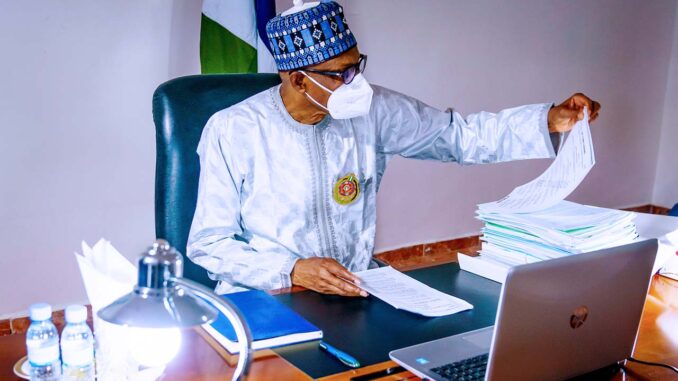
Nigerians are not amused by the seeming politicisation of safety of lives and property of citizens, as manifested in reports that the House of Representatives has apologised to the presidency over the house’s invitation asking President Buhari to address it on security.
It is as well that the House has denied making any such apology. What really is at stake is beyond whether or not the Representatives have power or constitutional backing to invite or, as the case may be, summon the president at all. The key issue is how to stop the wanton killing of Nigerians, and destruction of their property by criminal elements who pose as insurgents or bandits, all with the simple aim of destabilising government.
The role allegedly played by state governors on the issue is instructive, as they seemed to be more concerned about possible invitation by their lawmakers to speak on issues of public interest. In real terms, no one can run away from the fact that criminals are fast taking over the Nigerian space and they will take over completely unless government puts up a drastic action. If President Muhammadu Buhari, governors and the Attorney General of the federation have viewed this matter from that point, the invitation to the house would not have been turned down; and perhaps, the nation could by now have the benefit of more concrete ideas on how to get out of its security quagmire.
Denying that it has apologised, the House, speaking through its spokesman Benjamin Kalu said “the President or the Presidency as the case may be never sought an apology from the House of Representatives for carrying out her constitutional responsibility to the Nigeria electorate,” and that “for the avoidance of doubt, the House never apologised to anyone for exercising her constitutional mandate.”
The House had passed a resolution inviting Buhari to appear and address it on how to stem the tide of insecurity in the country. This followed the murder of about 43 rice farmers in Borno on the 23rd of November 2020. Before and after the incident, hapless Nigerians in huge numbers are being killed daily by bandits while the security agencies looked on helplessly. All that the average Nigerian is interested in is an assurance that he can safely visit his farms without the need of first obtaining a military clearance.
Insecurity in the country particularly in the North, is at an all-time high, a situation where famers are afraid to visit their farms even in the harvest seasons for fear of being killed by herdsmen or members of Boko Haram sect. Homes of rural dwellers are ransacked and razed while women and young girls are raped. The brigandage, fast assuming a national outlook, has attracted wide condemnations particularly on account of failure of security apparatus in the country.
Despite billions of dollars expended on the war against Boko Haram insurgency, there appears to be no end in sight with thousands killed and over two million persons displaced. Surely at a time like this, a leader hardly requires an invitation to address the people whom he professes to represent on steps being taken to guarantee their safety. Buhari does not require an explicit constitutional provision to address Nigerians over the spate of insecurity in the nation. If communication is one of the attributes of a good leader, the silence of the President is awkward. Perhaps the President would have been saved the supposed embarrassment of an invitation by the House of Representative if its administration had lived up to its responsibilities. Stakeholders, inclusive of state governors who are the chief security officers of their respective states, have persistently called for a total overhaul of the security architecture of the country, and the adoption of a State Police system as would enable grassroots policing. But the presidency has remained mute on the topic.
President Buhari’s administration must realise that there is a world of difference between the letters of the law and the spirit of the law; and that justice usually resides in the latter. The Constitution of the Federal Republic of Nigeria, declares that sovereignty belongs to the people of Nigeria from whom government derives all its powers and authority; and the security and welfare of the people shall be the primary purpose of government. For someone who travelled across the country addressing crowds of supporters while vying for the job, it should not be too much for the president to appear before a small section of the people’s representatives to explain, even answer questions, on the primary purpose for which he was elected. No man, however, great is greater than his people.
And politicians must remember that as public servants in a democratic system of government, they owe the people a duty to account.
Rather than posturing over powers, the presidency should have seized the opportunity to regain what is left of a fast receding goodwill upon which he rode to power, by empathizing with the people and prove to his critics that he indeed is in charge of the situation. Lest he forgets, as President and Commander-in-chief of the Armed Forces, the insecurity situation in the country reflects poorly on him and it behooves him to reassure Nigerians, by his actions, that their confidence reposed on him has not been misplaced.
END

Be the first to comment